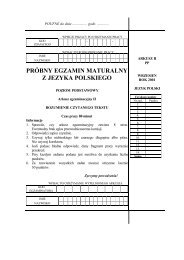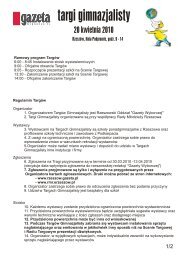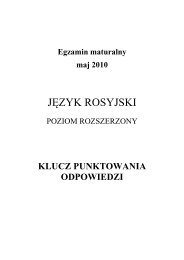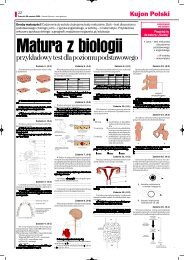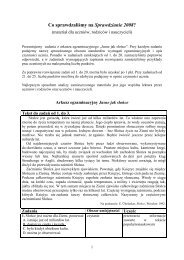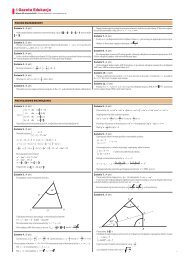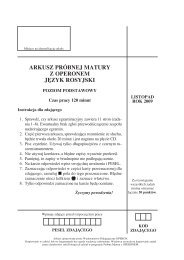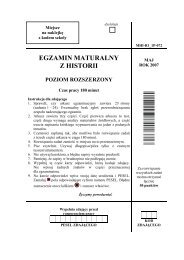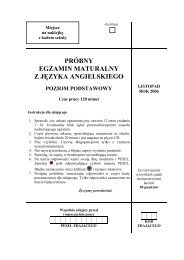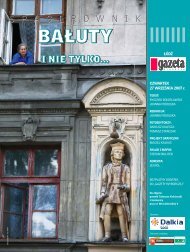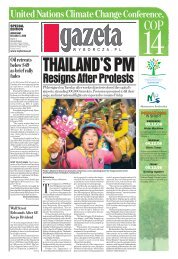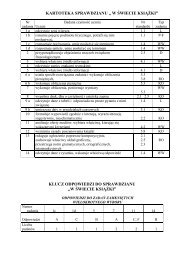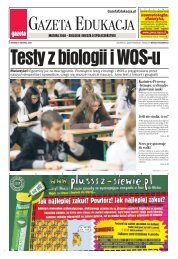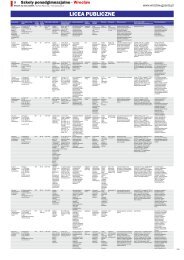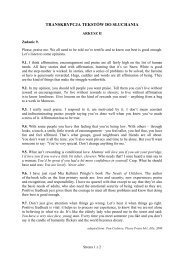Arkusz II - Gazeta.pl
Arkusz II - Gazeta.pl
Arkusz II - Gazeta.pl
Create successful ePaper yourself
Turn your PDF publications into a flip-book with our unique Google optimized e-Paper software.
Rozumienie ze słuchu<br />
ZADANIE 9 (5 pkt)<br />
Zapoznaj się ze zdaniami podanymi obok.<br />
Usłyszysz dwukrotnie fragment powieści współczesnego pisarza brytyjskiego<br />
(mp3 na www.gazeta.<strong>pl</strong>/edukacja – wejdź w język angielski).<br />
Zdecyduj, które zdania są zgodne z treścią tekstu (TRUE), a które<br />
nie (FALSE).<br />
Zaznacz znakiem (X) odpowiednią rubrykę w tabeli.<br />
9.1. Annie was considering moving out of the house<br />
for a short time.<br />
9.2. Annie’s husband had made a special effort<br />
to celebrate their anniversary.<br />
9.3. At first, Annie refused to believe what her husband<br />
told her he had decided to do.<br />
9.4. Annie noticed immediately that there<br />
was something different about the pond.<br />
9.5. The fish Annie’s husband had owned<br />
were worthless.<br />
Za każdą poprawną odpowiedź otrzymasz 1 punkt.<br />
ZADANIE 10 (5 pkt)<br />
Zapoznaj się ze zdaniami (10.1-10.5). Usłyszysz dwukrotnie rozmowę<br />
z ekologiem (mp3 na www.gazeta.<strong>pl</strong>/edukacja – wejdź w język<br />
angielski), który jest ekspertem w dziedzinie usuwania odpadów.<br />
Z podanych możliwości wybierz właściwą, zgodną z treścią usłyszanych<br />
informacji. Zakreśl literę A, B, C lub D. Za każdą poprawną<br />
odpowiedź otrzymasz 1 punkt.<br />
10.1. According to John Croft, during the last century the <strong>pl</strong>astic bag<br />
A. was one of the most dangerous inventions.<br />
B. became more widespread than most other products.<br />
C. reached its peak of production.<br />
D. took years to perfect when it was invented.<br />
10.2. John im<strong>pl</strong>ies that recent research by supermarket chains has<br />
A. largely gone unnoticed.<br />
B. led to an increase in the number of shopping bags.<br />
C. been discussed a lot by customers.<br />
D. resulted in customers providing their own shopping bags.<br />
10.3. A new process being tested at the moment<br />
A. involves a substance which makes the <strong>pl</strong>astic in bags softer.<br />
B. ensures that tough <strong>pl</strong>astic breaks up quickly.<br />
C. means that the lifespan of <strong>pl</strong>astic bags is much shorter.<br />
D. consists of a sim<strong>pl</strong>e method of disposing of flexible <strong>pl</strong>astic.<br />
10.4. Much of the <strong>pl</strong>astic waste produced in Britain<br />
A. is produced by the food industry.<br />
B. is thrown away in the form of litter.<br />
C. is used once only then thrown away.<br />
D. finds its way to landfill sites.<br />
10.5. Critics of the new technology insist that<br />
A. it will not encourage peo<strong>pl</strong>e to manage waste effectively.<br />
<strong>Arkusz</strong> <strong>II</strong><br />
Poziom rozszerzony<br />
TRUE FALSE<br />
Czas: 70 min<br />
B. it will result in a huge rise in <strong>pl</strong>astic waste.<br />
C. there aren’t enough waste tips to deal with the problem.<br />
D. greenhouse gasses may decrease but global warming will not.<br />
ZADANIE 11 (5 pkt)<br />
Zapoznaj się z poniższymi zdaniami oznaczonymi (11.1-11.10).<br />
Usłyszysz dwukrotnie wywiad z wnukiem jednego z pierwszych zdobywców<br />
Mount Everest (mp3 na www.gazeta.<strong>pl</strong>/edukacja – wejdź w<br />
język angielski). Wybierz 5 zdań, których treść jest zgodna z tekstem<br />
i zaznacz je, wpisując znak (X) w tabeli obok wybranego zdania. Za<br />
każdą poprawną odpowiedź otrzymasz 1 punkt. Jeśli zaznaczysz<br />
więcej niż 5 zdań otrzymasz 0 punktów za całe zadanie.<br />
11.1 Sherpas who climb the mountain are disobeying<br />
the gods.<br />
11.2 Sherpas who choose not to attempt Everest will live<br />
longer than those who do.<br />
11.3 At first the Sherpas were unhappy that the mountain<br />
had been climbed.<br />
11.4 Tenzing Norgay predicted that Everest<br />
would become popular.<br />
11.5 Nowadays the Sherpas limit the number<br />
of trips to Everest.<br />
11.6 The Sherpas feel they are responsible<br />
for the environment in the mountains.<br />
11.7 Only experienced climbers should attempt Everest.<br />
11.8 You are more likely to survive if you have prepared<br />
yourself mentally as well as physically.<br />
11.9 Sherpas experience far fewer problems with<br />
the altitude than Westerners.<br />
11.10 Sherpas are used to eating fatty, spicy foods.<br />
Rozumienie tekstu czytanego<br />
ZADANIE 12 (3 pkt)<br />
Przeczytaj fragment powieści. Z podanych odpowiedzi wybierz właściwą,<br />
zgodną z treścią tekstu. Zaznacz jedną z czterech możliwości,<br />
zakreślając literę A, B, C lub D. Za każdą poprawną odpowiedź otrzymasz<br />
1 punkt.<br />
FROM KAZUO ISHIGURO’S THE REMAINS OF THE DAY<br />
I lodged last night in an inn named the ’Coach and Horses’ a little way<br />
outside the town of Taunton, Somerset. This being a thatched-roof cottage by<br />
the roadside, it had looked a conspicuously attractive prospect from the Ford<br />
as I had approached in the last of the daylight. The landlord led me up a timber<br />
stairway to a small room, rather bare, but perfectly decent. When he inquired<br />
whether I had dined, I asked him to serve me a sandwich in my room, which<br />
proved a satisfactory option as far as supper was concerned. But then as the
evening drew on, I began to feel a little restless in my room, and in the end<br />
decided to descend to the bar below to try a little of the local cider.<br />
There were five or six customers all gathered in a group around the bar<br />
– one guessed from their appearance they were agricultural peo<strong>pl</strong>e of<br />
one sort or another – but otherwise the room was empty. Acquiring<br />
a tankard of cider from the landlord, I seated myself at a table a little<br />
way away, intending to relax a little and collect my thoughts concerning<br />
the day. It soon became clear, however, that these local peo<strong>pl</strong>e were<br />
perturbed by my presence, feeling something of a need to show hospitality.<br />
Whenever there was a break in their conversation, one or other of them<br />
would steal a glance in my direction as though trying to find it in himself<br />
to approach me. Eventually one raised his voice and said to me: ’It seems<br />
you’ve let yourself in for a night upstairs here, sir.’<br />
When I told him this was so, the speaker shook his head doubtfully<br />
and remarked: ’You won’t get much of a sleep up there, sir. Not unless<br />
you’re fond of the sound of old Bob’ – he indicated the landlord -’banging<br />
away down here right into the night. And then you’ll get woken by his<br />
missus shouting at him right from the crack of dawn.’<br />
Despite the landlord’s protests, this caused loud laughter all round.<br />
12.1 The writer decided to go down to the bar at the inn because<br />
A. it had looked attractive as he had entered the inn.<br />
B. it would provide him with more than a sandwich for his supper.<br />
C. he wanted to meet some of the local peo<strong>pl</strong>e before he went to bed.<br />
D. he began to feel he needed a change of scene.<br />
12.2 What comment does the writer make about the peo<strong>pl</strong>e in the bar?<br />
A. They all seemed to be from different family backgrounds.<br />
B. They seemed distant and unfriendly towards him.<br />
C. They seemed to want to involve him in their conversation.<br />
D. They were staring at him as if they did not trust him.<br />
12.3 One of the peo<strong>pl</strong>e in the bar joked that<br />
A. the writer might have a somewhat disturbed night.<br />
B. the landlord and his wife always argued all night long.<br />
C. guests stayed in the bar until the early hours of the morning.<br />
D. the landlord rarely had an overnight guest at the inn.<br />
ZADANIE 13 (5 pkt)<br />
Przeczytaj fragment artykułu, z którego usunięto cztery zdania.W<br />
pierwszej części zadania wpisz w każde z miejsc (13.1-13.4) literę<br />
(A-E), którą oznaczone jest brakujące zdanie. Jedno z podanych<br />
zdań nie pasuje do tekstu.W drugiej części zadania wybierz zakończenie<br />
zdania zgodne z treścią artykułu. Za każdą poprawną odpowiedź<br />
otrzymasz 1 punkt.<br />
JOURNEY TO THE ROCKIES<br />
The legendary transcontinental ’The Canadian’, which travels between<br />
Toronto and Vancouver, covers a staggering 2,000-<strong>pl</strong>us miles, passes<br />
through four time zones and takes around 72 hours – assuming your<br />
train isn’t delayed by a moose wandering onto the line, or by a mudslide.<br />
(13.1)________. Now that’s what I call a serious train journey.<br />
The trip was of special significance to me since I was following in<br />
my father’s footsteps. He had left for Canada more than 50 years ago,<br />
before eventually returning to Britain. (13.2)________ My travelling<br />
companions and I got our first glimpse of ’The Canadian’ in Toronto’s<br />
Union Station. After storing my bags in my ’roomette’ (single berth<br />
cabin), I headed for the dome cars. Then minutes later I heard a guard<br />
crying, ’All aboard!’ and we were on our way. As we made our way<br />
through the stunning scenery I learned from the guards that my journey<br />
was considerably more comfortable than my father’s. (13.3)________<br />
At the other extreme, in summer it got so hot that they sometimes had<br />
to haul blocks of ice inside the train to cool peo<strong>pl</strong>e down.<br />
I also learned that the west coast province of British Columbia only<br />
agreed to join the Canadian Confederation on the condition that the<br />
government built a railroad linking it with the rest of the country. The<br />
last spike was eventually hammered into the line in 1885, securing<br />
British Columbia for Canada. (13.4)________ Thanks to them, however,<br />
travelling on one of the greatest rail journeys in the world remains the<br />
experience of a lifetime.<br />
Część I<br />
A. Back in the days before mass air travel, if you were heading out to<br />
North America’s west coast, the only way to do so, unless you were<br />
wealthy, was to take a ship across the Atlantic and then<br />
a transcontinental train.<br />
B. Indeed, it’s not unusual to see elk and mule deer stroll down the<br />
high street in Jasper, the quaint little town high in the Rockies that<br />
was our last stop before reaching Vancouver the next morning.<br />
C. But the price was high: one man a mile reputedly died laying the<br />
track.<br />
D. Not only that but it takes in the wilderness known as the Canadian<br />
Shield, vast prairie lands and the towering Rockies.<br />
E. In his day, when it was -40°C during the depths of winter, a train’s<br />
wheels would sometimes freeze up.<br />
Część <strong>II</strong><br />
Na podstawie informacji zawartych w tekście wybierz odpowiedź zgodną<br />
z jego treścią. Zakreśl jedną z czterech możliwości A, B, C lub D.<br />
13.5 The trip was particularly important to the writer because<br />
A. he had never seen such beautiful scenery before.<br />
B. he was able to learn a lot about the history of the railroad.<br />
C. he was reliving a part of his father’s past life.<br />
D. he had never been on such a long train journey before.<br />
Rozpoznawanie struktur leksykalno-gramatycznych<br />
ZADANIE 14 (4 pkt)<br />
Przeczytaj uważnie poniższy artykuł. Z podanych odpowiedzi wybierz<br />
właściwą, tak aby otrzymać logiczny i gramatycznie poprawny<br />
tekst. Zaznacz jedną z czterech możliwości, zakreślając literę A,<br />
B, C lub D. Za każdą poprawną odpowiedź otrzymasz 0,5 punktu.<br />
THE SECRETS OF SPEECH<br />
The study of speech is a fascinating topic for research. Scientists (14.1)<br />
________ to unravel the workings of the human brain have discovered for<br />
the first time how it picks out speech from other noises and works out<br />
(14.2)________ just the meanings of words.<br />
As Britain’s research councils launch a push to understand exactly (14.3)<br />
makes humans master communicators, the results so far are startling.<br />
What has puzzled researchers over the years is how we are so good<br />
(14.4)________ language and are able to convey and perceive information<br />
not just by using words, but with more subtle devices (14.5)________<br />
as intonation and rhythm. Among the big guns rolled out by researchers<br />
to crack the mystery of human language is the brain scanning technique,<br />
functional magnetic resonance imaging (fMRI). Able to take snapshots<br />
of brain activity, fMRI gives a fascinating insight (14.6)________ the<br />
inner workings of the brain. Using fMRI, Dr Sophie Scott, an expert in<br />
speech neurobiology at University College London, (14.7)________<br />
discovered that the brain takes speech and separates it into words and<br />
’melody’ – the varying intonation in speech that reveals mood, gender,<br />
and so on. Her studies suggest that words are then moved over to the left<br />
temporal lobe for processing, (14.8)________ the melody is channelled<br />
to the right side of the brain, a region more stimulated by music.
14.1<br />
A. trying<br />
B. try<br />
C. tried<br />
D. have tried<br />
14.2<br />
A. as much as<br />
B. most of<br />
C. more than<br />
D. so many more<br />
14.3<br />
A. which<br />
B. whether<br />
C. that<br />
D. what<br />
14.4<br />
A. in<br />
B. at<br />
C. for<br />
D. of<br />
14.5<br />
A. such<br />
B. so<br />
C. like<br />
D. similar<br />
14.6<br />
A. around<br />
B. over<br />
C. into<br />
D. between<br />
14.7<br />
A. was<br />
B. has<br />
C. is<br />
D. having<br />
14.8<br />
A. since<br />
B. throughout<br />
C. during<br />
D. while



